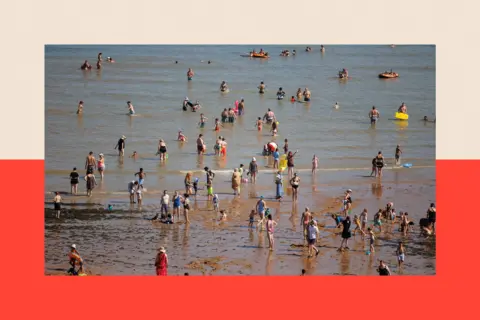Extreme heat is starting to change the way we holiday

Extreme heat is starting to change the way we holiday

 Simon KingLead Weather Presenter•@SimonOKing
Simon KingLead Weather Presenter•@SimonOKing
 BBC
BBCIt was the summer of 2023, and Katie Piercefield-Holmes from Suffolk travelled to the Greek island of Rhodes with her husband and two children for a 10-day holiday.
They'd booked a room with air conditioning at a resort, intending to spend the time relaxing in the swimming pool and sightseeing – but this wasn't possible because of the searing heat. "Even after breakfast, a five-minute walk would be unbearable," she recalls.
Then came the wildfires, which swept across the island. "With the heat from the wildfires, it felt over 40C," she adds.
In all, some 19,000 people were evacuated from their homes or holiday accommodation in Rhodes that July. Pictures of tourists fleeing the island were splashed across newspaper front pages and one newlywed couple from Glasgow described it as like "being thrown into a disaster film". Katie's family was advised to evacuate their villa, but chose to stay, believing it would be safer.
The experience has, she says, changed the way she and her family have holidayed for good.
 Reuters
Reuters
The summer heatwave of 2023 gripped much of Europe, particularly countries around the Mediterranean including Greece, Italy, Spain, Turkey and Cyprus. Temperatures reached 40-45C by day in some regions.
In all, there were more than 47,000 heat-related deaths throughout Europe in 2023, according to the Barcelona Institute for Global Health (ISGlobal) – most were in southern areas.
The previous year had also seen multiple heatwaves across Europe, including the first recording of 40C in the UK. More than 68,000 people died on the continent, according to ISGlobal.
While the 2024 season in Europe wasn't as extreme, scientists are clear that human-induced climate change is leading to more frequent and intense heatwaves around the world.
But along with this change in summer weather comes other changes too. In all, 81% of Europeans say they have tweaked their holiday plans because of factors related to climate change, according to a report published in April by the European Travel Commission (ETC).
Almost a third are choosing destinations where the weather is milder.
Ms Piercefield-Holmes is among them. She has returned to Greece with her family since 2023, but only during the cooler months of October and May - during the summer, the family still travel but take a different approach. "We go [somewhere] where it isn't as hot and can plan different activities like hiking and sightseeing," she explains.
The family are not along. Simon Calder, a journalist and broadcaster on BBC's The Travel Show, says that a number of travel agents have observed some families choosing to take their main holiday over Easter, rather than during the summer.

 PA Media
PA MediaAnd this could well be a growing trend: Bas Amelung, a professor in environmental systems analysis at Wageningen University, says that certain parts of Europe might become too hot for many in the future. "Countries such as Spain, France, Italy, Greece and Turkey that currently attract the traditional 'sun and sand' summer tourists are likely to become too hot for comfort in the summer," he says.
But he also believes that even if temperatures don't go up much in the short term, the perception may still stick.
"People take decisions based on their perceptions," he explains. "So if a large majority of holidaymakers thinks some European destinations will soon be 'too hot', they may well start adapting, either by going somewhere else in summer or by going to the same place in another season."
Which all begs the question, what does that mean for holiday resorts across the Mediterranean, in particular those that have come to rely on summer tourism trade? And if the idea of "high season" changes, what does that mean for the tradition of a seaside summer holiday?
Extreme weather in the Med
It’s not just heatwaves - climate change is affecting tourism in other ways too.
Sea level rises are projected to increase by around 0.8-0.9m by 2100. This could lead to a long-term threat to some beachside resorts, including a number in the Caribbean, which are typically less than 1m above current sea levels.
Pacific islands, meanwhile, are vulnerable to storm surges – these could also be threatened by rising sea levels, as well as changing weather patterns. Cyclones in the region could become more intense too, according to Australia's Bureau of Meteorology.
It is Europe, though, that will most affect British holidaymakers. Currently it is their top destination - and according to the World Meteorological Organisation, Europe is also the fastest-warming continent on Earth.More from InDepth
Beaches, in particular, could be at risk. One study suggests that a fifth of the sandy coastline of the Mediterranean could face severe loss by 2050, under the middle of the IPCC's five climate projections scenario.
Southern Italy and the Iberian peninsula are also identified as being at high risk due to climate change.
Meanwhile Greek Prime Minister Kyriakos Mitsotakis told a cabinet meeting in 2023: "We are already experiencing the effects of the climate crisis, and we know that things will probably get worse, not better, with higher temperatures, more drought and strong winds."
The resorts that are adapting
Already, there are some small signs that indicate more people are holidaying outside the traditional peak season. In all, 8% fewer people plan to travel to the Mediterranean this summer compared to last year, according to Teodora Marinska, chief operating officer of the ETC.
Meanwhile, more people appear to be travelling to the region outside the traditional months: Greece saw a 20% increase in spring tourism in 2024 compared with the same period in 2023, according to analysts from the National Bank of Greece.
And foreign arrivals to Spain exceeded 10 million in January and February of 2025 – almost a 20% increase versus 2019 levels.
"These are increases on small numbers, because these nations are usually quite empty in the winter, but we can already see that the growth is concentrated there," explains Ms Marinska.
This has been welcomed by authorities in some places. "We've seen destinations increasing investment in connectivity in the winter months – for instance, adding flights to the winter schedule."
Rather than destinations emptying out in the summer months, Ms Marinska sees it as more a levelling of the peak to a gentle curve – which could boost economies of tourist hotspots, instead of damaging them.
"Tourist boards have been investing heavily in fighting the seasonality trend, not only because of overtourism, but because it's much more sustainable for a hotel to stay open all year round [and] jobs are more stable," she adds.
For example the German highland region of Spessart, in Bavaria and Hesse, is shifting its focus to year-round tourism by developing new trails and promoting activities such as hiking, biking and wellness.

 Reuters
ReutersCertain places on the Med popular with tourists are also starting to adapt what they offer.
"Countries, such as Spain, are starting to wake up to the consequences of climate change and the reality of the need to adapt," says Prof Amelung. "Things are starting to change slowly, but surely."
A number of towns are, for example, offer evening markets and indoor activities during the hottest parts of the day. Mr Calder recalls going on a walking tour of the Italian Adriatic city of Grado that began at 10pm.
Yet in some areas there are cost implications. In 2024, Greece replaced its accommodation tax with a new "climate crisis resilience tax" that aims to support rebuilding efforts after climate related disasters.
It means that for a week's holiday in Greece between April and October, travellers could be charged up to £88 extra per room.
From staycations to summers in Scandinavia
All of this could lead to some new patterns in the way people spend their vacations - and where they go.
Staycations, for example, could become even more popular. More than half of UK holidaymakers say they are likely to choose to holiday at home rather than abroad for climate-related reasons, according to 2024 research by Mintel. Some 28% say warmer UK temperatures are encouraging them to take domestic holidays.
What remains to be seen is how this could affect the price tag. "A significant shift in holiday habits could push up the cost of a domestic holiday," says Mr Calder.
"If more people decide to stay in the UK, and others come to Britain because it is more climatically appealing, the rise in demand would trigger price increases. But there are always locations where you can get reasonable deals."
 EPA - EFE/REX/Shutterstock
EPA - EFE/REX/Shutterstock
Industry experts have also noticed a growing trend of holidaymakers choosing different, less traditional destinations in Europe too for their summer breaks.
"There is an increased emphasis on travel to northern destinations, with more routes to Iceland, Norway and Finland than ever… spreading tourism more evenly," according to Mr Calder.
"Destinations such as Scandinavia that weren't hugely popular in the past are also becoming a bit more fashionable due to Instagram trends," agrees Sean Tipton of the Association of British Travel Agents.
A number of alternative European beach destinations are becoming more popular: places like Albania, Montenegro or Bulgaria are growing at a much faster pace than traditional destinations, observes Ms Marinska.
"The beach holiday is still by far the more popular type," she stresses. "But there's a shift in behaviour, and people are choosing different destinations for their beach holidays."
The school holidays factor
Although many experts are predicting that holiday patterns will shift, it doesn't appear to be happening on a large scale. And, there are limits to these shifts.
While certain groups can be more flexible about when they holiday, such as retirees or those without young children, this may not be possible for those with children of school age who want to break up the long summer period, points out Prof Amelung.
Even some people I spoke to who have been caught up in extreme situations on holiday aren't deterred from seeking out sunnier climes during the summer.
Daniel Rolfe, who was on honeymoon in Rhodes during the 2023 wildfires, is one of them. "We wouldn't necessarily change holiday plans or habits because of climate change and hot weather [but] we'd look at how likely wildfires might be before going anywhere".
But, warns Prof Amelung, if there are many more very hot summers, holiday patterns may yet change.
"If we have major heatwaves and wildfires all across the Med in three or four out of the next five summers, this may well be a tipping point in public perception, going from 'the Mediterranean climate is ideal for summer holidays' to 'the Mediterranean is just unbearably hot in summer; let's go somewhere else'."
Top picture credit: Mizina/ Getty Images
BBC InDepth is the home on the website and app for the best analysis, with fresh perspectives that challenge assumptions and deep reporting on the biggest issues of the day. And we showcase thought-provoking content from across BBC Sounds and iPlayer too. You can send us your feedback on the InDepth section by clicking on the button below.
What's Your Reaction?
 Like
0
Like
0
 Dislike
0
Dislike
0
 Love
0
Love
0
 Funny
0
Funny
0
 Angry
0
Angry
0
 Sad
0
Sad
0
 Wow
0
Wow
0





































